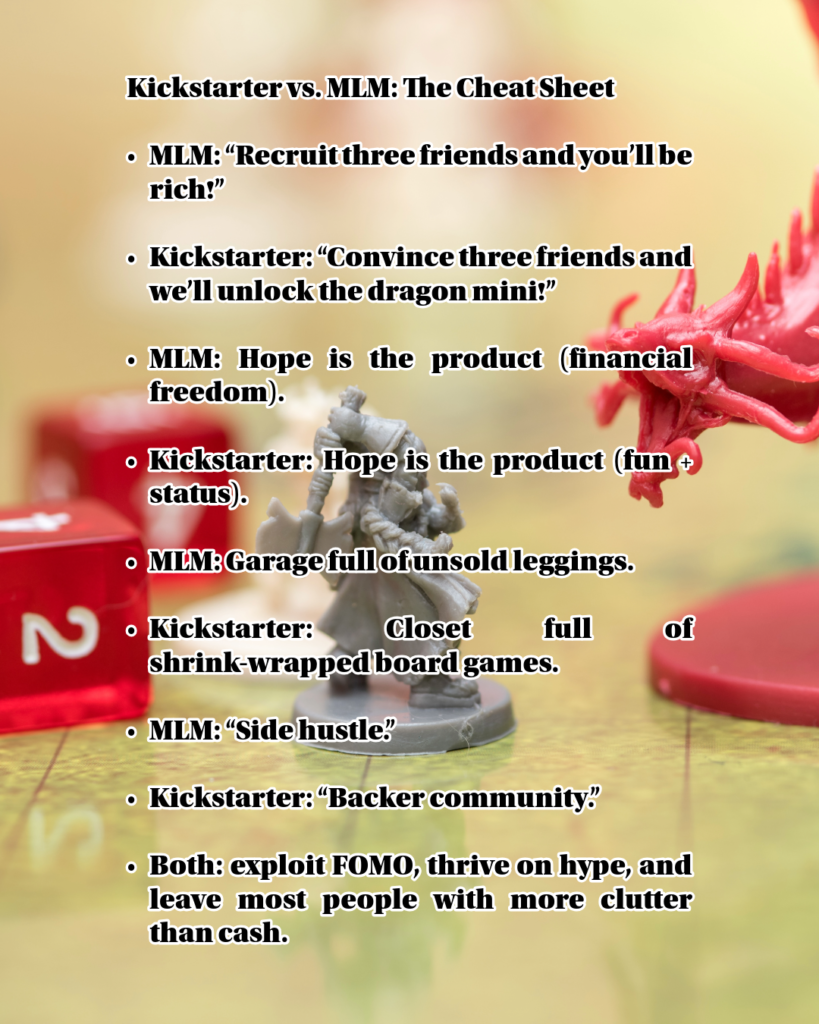There’s an old saying: if something looks like a pyramid scheme, smells like a pyramid scheme, and feels like a pyramid scheme… It’s probably a Kickstarter board game.
Okay, that’s unfair. I definitely just made that up; however, it has a ring of truth to it. Kickstarter is technically not an MLM. Nobody’s recruiting downlines. Nobody’s promising passive income if you convince your cousin to buy ten starter kits. Instead, you’re promised stretch goals, metallic dice, and an art book you’ll never actually read.
But the parallels are uncanny. I will be honest with you upfront here: I have never backed a Kickstarter. The entire format feels weird to me, which might be why I also don’t play the Lottery.
Hype as Recruitment
MLMs thrive on evangelism: convince others to join, and their money props up your “business.” Kickstarter doesn’t need a formal downline, but it still runs on peer-to-peer hype. The comment sections and Discord servers sound like revival tents. “We just need 500 more backers to unlock the exclusive miniatures!” isn’t far from “Bring in three more friends to hit Diamond Tier.”
The creators make you feel like a stakeholder. You’re not just buying a game! You’re part of a movement! And once you’ve pledged, you start proselytizing. Why? Because you need this thing to succeed, both to justify your sunk cost and to prove your taste is superior.
Hope as Currency
MLMs sell the dream of financial freedom. Kickstarter sells the dream of fun. Both run on “what if.”
- What if this is the next Gloomhaven?
- What if this resin dragon mini actually ships before 2030?
- What if this cyberpunk enamel pin really does “change the world”?
Consumer psychology tells us hope is more powerful than certainty. Studies on gambling show that the anticipation of reward triggers stronger dopamine hits than the reward itself. Kickstarter has weaponized that: the campaign countdown, the stretch goal reveal, the dopamine drip of updates. You’re not buying a product, really, you’re buying the ride.
The Male Gamer Angle
MLMs overwhelmingly target women with wellness shakes, essential oils, or leggings. Kickstarter gaming culture flips the script: it’s largely men pouring disposable income into plastic armies and deluxe cardboard. The mechanics are the same—community belonging, identity, and status—but the product is tailored to a different demographic.
- Instead of showing off your “side hustle,” you’re flexing your all-in pledge with 17 expansions.
- Instead of a pink Cadillac, you get a giant box that doubles as furniture.
- Instead of endless Zoom calls with your upline, you’re watching a designer livestream while your partner asks if you’ve considered a savings account.

Economics of FOMO
Here’s the kicker (PUN 100% INTENDED): Kickstarter leans hard on the scarcity model. Limited runs, exclusive rewards, “never again” pledges. Behavioral economists call this the scarcity heuristic: we value things more if they feel rare. That’s why so many gamers back projects they’ll never even open. The shrink-wrapped pile of shame isn’t a bug, it’s a feature.
Honestly, the creators know this. Just like MLM uplines, they dangle the dream of success but rarely shoulder the risk. If the project fails? Oh well, thanks for the capital. If it ships late? Hey, you backed an “idea,” not a guarantee. The financial liability is shifted onto you, the consumer, who now feels like an “investor.”
The Difference That Matters
Kickstarter isn’t a pyramid scheme. There’s no recruiting tree, no illusion of passive income. It’s not quite that exploitative. But it’s also not just “buying a product.” It’s a hybrid of shopping, gambling, and fandom, dressed up as participatory entrepreneurship.
The truth is, Kickstarter isn’t the male gamer MLM. It’s the male gamer Lottery:
- High-risk.
- Community-fueled.
- Occasionally “life-changing.”
- But mostly, just a very expensive way to buy hope.
And just like the lottery, someone’s going to hit it big. It probably won’t be you. But hey, at least you’ll get some cool dice.
